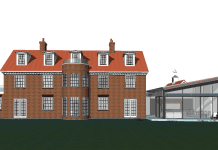Wayne Oakes, director at multi-disciplinary engineering consultancy Dice, expects the move towards modern methods of construction to grow as the firm is tasked with delivering more modular projects
The interest in modern methods of construction (MMC), and specifically modular, has been growing, albeit slowly, since before the pandemic. However, lockdown has seen a greater emphasis placed on its utilisation as developers and housebuilders look for innovative solutions to quickly deliver much-needed housing.
As an industry, we’ve been talking about MMC for many years but it still only accounts for a fairly small percentage of total housing delivery in this county, with traditional housebuilding by far the primary build method in the UK.
However, thanks to the government’s ‘Build Build Build’ and ‘Green Industrial Revolution’ pledges, the wider industry has been forced to start thinking differently. The housebuilding sector is considering ways they can innovate, adapt, and ultimately build more homes in the face of the restrictions we all face because of the coronavirus pandemic.
The benefits of modular construction are no secret, increased safety on site and schedule certainty as well as less material waste and fewer delays. But despite many within the industry calling for greater use, modular take up has remained slow and only accounts for a very small percentage of housing delivery at the moment.
The proportion of new homes built using MMC is predicted to increase from the current 6-10% to 20% of the market share in the next years, according to the recent report from Savills. However, in order to meet not only the UK’s housing delivery target but also the aim of becoming carbon neutral by 2050 – this has to increase.
Educating the industry and breaking the stigma
The key reason, in my opinion, that the industry has been slow to accept MMC is largely down to a lack of knowledge. There is also a stigma around modular and a general reluctance to change as people are used to working in the traditional way.
There is a perception that the product has no integrity of design and is low quality, but that simply isn’t the case for modern modular homes. There is a real misunderstanding within the sector about modular and this reluctance to learn is stunting innovation and growth in the residential sector – and ultimately preventing us from building homes at the rate required to meet government targets.
Unlocking affordable housing
The pandemic has started to change this as developers and landowners are starting to consider how to move forwards. For instance, we have started to see local authorities look towards modular building as a way to unlock residential sites to deliver affordable housing.
A modular housing scheme that we’re currently working on is with Bassetlaw District Council. It is the first MMC project for the authority and will deliver 120 homes in Nottinghamshire.
Working closely with Faithful+Gould – the project/commercial manager and principal designer for the scheme – this project marks our tenth modular scheme. We are responsible for looking at the flood risk, drainage, transport, and structural design as well as providing specialist modern methods of construction advice.
Faithful+Gould was appointed to the scheme via direct award through Lot 1 of the Pagabo Professional Services Framework and selected a local design team of Nottingham SME’s, including Dice, to work on the project.
Andrew Prickett, director and head of residential at Faithful+Gould, said: “The modular approach will help us deliver the Radford Street development quicker, more cost-effectively, and crucially, at a consistent and high quality.
“By combining Faithful+Gould’s knowledge of the modular housing sector with our exceptional approach to delivery, we can help the Council deliver on its vision, and the UK reach its target of 300,000 new homes each year.”
An incredibly viable option for post-pandemic recovery
The scale of our work has definitely increased in the last year – from roughly 10 units on a single development to almost 700 on our most recent scheme.
Modular schemes help to deliver modern, innovative and energy-efficient housing schemes that improve neighbourhoods, support local jobs as well as the council’s ambition to increase the amount of housing. However, we need it on a wider scale to really make a dent in the 300,000 new homes target set by the government.
It’s clear that more and more decision-makers are waking up to the fact that modular housing is an incredibly viable option for post-pandemic recovery. But we still need to go further so I just hope we continue to see action rather than all the talk of pre-Covid times.

Wayne Oakes
Director

















